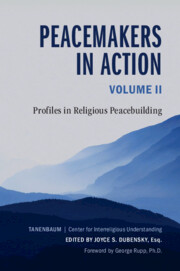Conflict Resolution and Peacebuilding
Abu-Nimer, Mohammed. “The Miracles of Transformation Through Interfaith Dialogue: Are You a Believer?” in Interfaith Dialogue and Peacebuilding, Smock, David R., ed., 15–32. Washington, DC: United States Institute of Peace Press, 2002.
Abu-Nimer, Mohammed. Nonviolence and Peacebuilding in Islam: Theory and Practice. Gainesville: University Press of Florida, 2003.
Abu-Nimer, Mohammed and Kaufman, Edward. “Bridging Conflict Transformation and Human Rights: Lessons from the Israeli–Palestinian Peace Process,” in Human Rights and Conflict: Exploring the Links Between Rights, Law, and Peacebuilding, Mertus, Julie and Helsing, Jeffrey W., eds., 277–308. Washington, DC: United States Institute of Peace Press, 2006.
Appleby, R. Scott. The Ambivalence of the Sacred: Religion, Violence, and Reconciliation. New York: Rowman & Littlefield, 2000.
Bandura, Albert. “Social-Learning Theory of Identificatory Processes,” in Handbook of Socialization Theory and Research, Goslin, David, ed., 213–262. Chicago: Rand McNally, 1969.
Barrett, Stanley R. Culture Meets Power. Westport, CT: Praeger, 2002.
Bronner, Stephen Eric. Peace out of Reach: Middle Eastern Travels and the Search for Reconciliation. Lexington: University Press of Kentucky, 2007.
Burton, John W., ed. Conflict: Human Needs Theory. New York: Palgrave Macmillan, 1993.
Collier, Paul. The Bottom Billion: Why the Poorest Countries Are Failing and What Can Be Done About It. Oxford: Oxford University Press, 2007.
Coward, Harold G. and Smith, Gordon S., eds. Religion and Peacebuilding. Albany: State University of New York Press, 2004.
Esquivia, Ricardo and Stucky, Paul. “Building Peace from Below and Inside: The Mennonite Experience in Colombia,” in From the Ground Up, Sampson, and Lederach, , eds., 122–140.
Festinger, Leon. A Theory of Cognitive Dissonance. Stanford: Stanford University Press, 1962.
Freire, Paulo. Pedagogy of the Oppressed, with a foreword by Shaull, Richard. London: Continuum, 1986; 30th Anniversary Edn., 2006.
Goodale, Mark and Merry, Sally Engle, eds. The Practice of Human Rights. New York: Cambridge University Press, 2007.
Gopin, Marc. Between Eden and Armageddon: The Future of World Religions, Violence, and Peacemaking. Oxford: Oxford University Press, 2000.
Gopin, Marc. Holy War, Holy Peace. New York: Oxford University Press, 2001.
Gopin, Marc. To Make the Earth Whole: The Art of Citizen Diplomacy in an Age of Religious Militancy. Lanham, MD: Rowman & Littlefield, 2009.
Green, Duncan. From Poverty to Power: How Active Citizens and Effective States Can Change the World. Oxford: Oxfam International, 2008.
Hayward, Susan and Marshall, Katherine, eds., Women, Religion, and Peacebuilding: Illuminating the Unseen. Washington, DC: United States Institute of Peace Press, 2015.
Johnston, Doug and Sampson, Cynthia, eds. Religion, the Missing Dimension of Statecraft. New York: Oxford University Press, 1994.
Lederach, John Paul and Appleby, R. Scott. “Strategic Peacebuilding: An Overview,” in Strategies of Peace, Philpott, and Powers, , eds., 19–44.
Lederach, John Paul and Sampson, Cynthia, eds. From the Ground Up: Mennonite Contributions to International Peacebuilding. Cambridge: Cambridge University Press, 2000.
Little, David with Tanenbaum Center for Interreligious Understanding, eds. Peacemakers in Action: Profiles of Religion and Conflict Resolution. New York: Cambridge University Press, 2007.
Marsick, Victoria J. and Sauquet, Alfonso. “Learning Through Reflection,” in The Handbook of Conflict Resolution: Theory and Practice, Deutsch, Morton and Coleman, Peter T., eds., 486–506. San Francisco: Jossey-Bass, 2000.
Martin-Ortega, Olga. “Building Peace and Delivering Justice in Bosnia and Herzegovina: The Limits of Externally Driven Processes,” in Transitional Justice and Peacebuilding on the Ground: Victims and Ex-Combatants, Sriram, Chandra Lekha, García-Godos, Jemima, Herman, Johanna, and Martin-Ortega, , eds., 139–158. New York: Routledge, 2013.
Maslow, Abraham H. Motivation and Personality, Frager, Robert, Fadiman, James, McReynolds, Cynthia, and Cox, Ruth, eds. 3rd edn. New York: Harper & Row, 1987.
McAdams, Dan P. The Stories We Live By. New York: Guilford Press, 1993.
Mertus, Julie and Helsing, Jeffrey W., eds. Human Rights and Conflict: Exploring the Links Between Rights, Law, and Peacebuilding. Washington, DC: United States Institute of Peace Press, 2006.
Philpott, Daniel and Powers, Gerard, eds. Strategies of Peace: Transforming Conflict in a Violent World. New York: Oxford University Press, 2010.
Ramsbotham, Oliver, Woodhouse, Tom, and Miall, Hugh. Contemporary Conflict Resolution. Malden: Polity Press, 2005.
Rothbart, Daniel and Cherubin, Rose. “Causation as a Core Concept in Conflict Analysis,” in Handbook of Conflict Analysis and Resolution, Sandole, Dennis J. D., Byrne, Sean, Sandole-Staroste, Ingrid, and Senehi, Jessica, eds., 61–70. London: Routledge, 2009.
Sachedina, Abdulaziz. The Islamic Roots of Democratic Pluralism. New York: Oxford University Press, 2001.
Sampson, Cynthia. “Local Assessments of Mennonite Peacebuilding,” in From the Ground Up, Lederach, and Sampson, , eds., 256–274.
Sampson, Cynthia and Lederach, John Paul, eds., From the Ground Up: Mennonite Contributions to Peacebuilding. New York: Oxford University Press, 2000.
Schirch, Lisa. The Little Book of Strategic Peacebuilding. Intercourse, PA: Good Books, 2005.
Schrock-Shenk, Carolyn, ed. Mediation and Facilitation Training Manual: Foundations and Skills for Constructive Conflict Transformation. Akron, PA: Mennonite Conciliation Service, 2000.
Sisk, Timothy D., ed. Between Terror and Tolerance: Religious Leaders, Conflict and Peacemaking. Washington, DC: Georgetown University Press, 2011.
Smock, David R., ed. Interfaith Dialogue and Peacebuilding. Washington, DC: United States Institute of Peace Press, 2002.
White, Andrew. Father, Forgive: Reflections on Peacemaking. Grand Rapids, MI: Monarch Books, 2013.
Zimmerman, Barry and Schunk, Dale, eds. “Albert Bandura: The Scholar and His Contributions to Educational Psychology,” in Educational Psychology: A Century of Contributions, Zimmerman, and Schunk, , eds., 431–457. Mahwah: Lawrence Erlbaum Associates, 2003.



